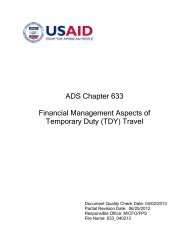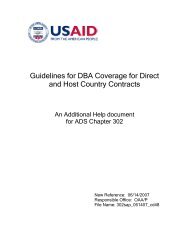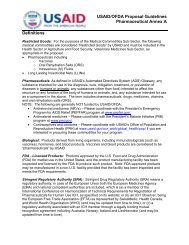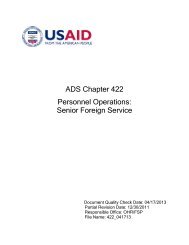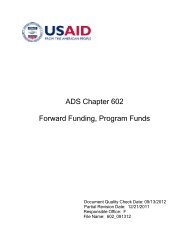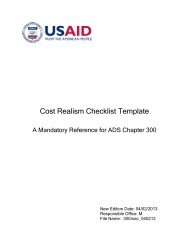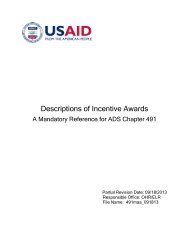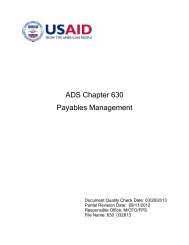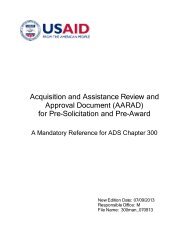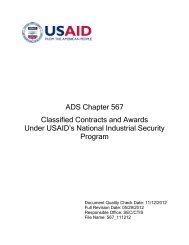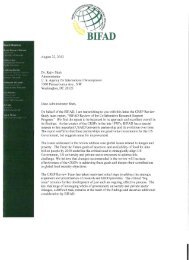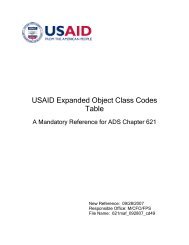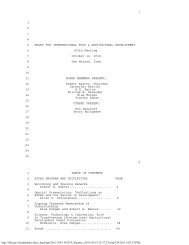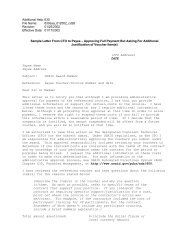ADS 610 â Use of Entertainment Account, Representation ... - usaid
ADS 610 â Use of Entertainment Account, Representation ... - usaid
ADS 610 â Use of Entertainment Account, Representation ... - usaid
You also want an ePaper? Increase the reach of your titles
YUMPU automatically turns print PDFs into web optimized ePapers that Google loves.
12/04/2012 Partial Revisionnature, (i.e., where the meal or other event is not incident to a conference, meeting, orother Agency business and cannot be funded with regular OE or program funds). Theevent must be for fostering relations with those outside the executive branch. It is notfor events attended solely by employees <strong>of</strong> the executive branch or employee-onlyAgency events. For example, a "courtesy” luncheon for a visiting foreign government<strong>of</strong>ficial hosted by the Administrator would be an appropriate use <strong>of</strong> the <strong>Entertainment</strong><strong>Account</strong>, even if almost all <strong>of</strong> the other attendees would be USAID employees.c. ES must approve the use <strong>of</strong> funds from the <strong>Entertainment</strong> <strong>Account</strong>. M/MSobligates funds from the account in accordance with ES decisions. The <strong>of</strong>fice oremployee requesting funds for entertainment must submit AID 3-12, Request andAuthorization <strong>of</strong> Official <strong>Entertainment</strong> Expenses, to ES for approval by theExecutive Secretary or Deputy Executive Secretary. Once approved in ES, M/MS willobligate funds. Employees may request reimbursement for authorized entertainmentexpenses by submitting an SF-1034, Public Voucher for Purchases and ServicesOther Than Personal to M/CFO/CMP at ei@<strong>usaid</strong>.gov. Employees must attach theAID 3-12 Form, along with a copy <strong>of</strong> receipts. ES may also use a purchase card forentertainment expenses. Regardless <strong>of</strong> the method, the charges for entertainmentexpenses must be applied to the appropriation account for entertainment.<strong>610</strong>.3.4 <strong>Representation</strong> AllowancesEffective Date: 12/04/2012a. Like the <strong>Entertainment</strong> <strong>Account</strong>, <strong>Representation</strong> Allowances are a separate lineitem within the OE account and are for overseas events <strong>of</strong> a protocol nature. [EOCC#2520201: The mandatory expanded object class code that must be used for reportingrequirements.]b. USAID's authority to issue its own regulations on representation expenses isSection 905 <strong>of</strong> the Foreign Service Act <strong>of</strong> 1980, as amended (FSA), 22 U.S.C. 4085.Section 905 authorizes the "Secretary" to provide for <strong>of</strong>ficial receptions and payentertainment and representational expenses. Under Section <strong>610</strong>(10) <strong>of</strong> the FSA, 22U.S.C. 3902(10), the term "Secretary" includes the head <strong>of</strong> any agency authorized toutilize the Foreign Service personnel system. Under Section 202(a)(1) <strong>of</strong> the FSA, 22U.S.C. 3922(a)(1), the Administrator <strong>of</strong> USAID is so authorized. USAID appropriationacts routinely appropriate representation funds. For example, $250,000 wasappropriated in FY 2012.c. USAID adheres to the Department <strong>of</strong> State’s Standardized Regulations (DSSR)on representation allowances (DSSR Chapter 300), except that the following prohibitionin DSSR 330 does NOT apply to USAID:The hire, purchase, operation, or repair <strong>of</strong> passenger-carrying vehicles (330a).USAID does NOT follow 3 FAM 3240, the Department <strong>of</strong> State procedures onrepresentation allowances. USAID Missions can establish a per capita cost for theText highlighted in yellow indicates that the adjacent material is new or substantively revised.7<strong>ADS</strong> Chapter <strong>610</strong>
12/04/2012 Partial Revisionvarious representation functions that are held at home, such as luncheons, dinners,cocktail parties, etc., and pay without requiring an itemization <strong>of</strong> actual expenses.d. <strong>Representation</strong> Allowances are obligated and reimbursed based on proceduresoutlined in Mission Orders.<strong>610</strong>.3.5 Program FundsEffective Date: 12/04/2012Program funds can be used for program-related refreshments, snacks, meals,receptions, and similar events for both non-employees and employees, provided thatthe expenditures are “necessary expenses” for achieving agency objectives under theFAA and applicable appropriations statutes, as described in <strong>610</strong>.3.7. Examples <strong>of</strong>permissible expenditures <strong>of</strong> program funds for food include:a. External Conferences and Meetings. As part <strong>of</strong> a conference or ameeting sponsored by USAID or others to discuss specific USAID programs withpersons or entities outside <strong>of</strong> USAID. For example, program funds could beused for refreshments for all attendees at a meeting at the Mission to discuss theMission’s strategic plan with partners.b. External Award Ceremonies. As part <strong>of</strong> an award ceremony that honorsnon-government personnel or both employees and non-government personnel inconnection with Agency programs or operations and is attended by individualsfrom outside the Agency. For example, program funds could be allocated for areception for the End Hunger Awards ceremony.c. Public Advisory Committee Meetings. For public advisory committees(committees not composed entirely <strong>of</strong> government employees) dealing withprogram issues. If the advisory committee is chartered to deal with OE matters,OE funds should be used.d. Program-Funded Employees. For program-funded employees, programfunds may be used for their costs under the same circumstances as those forOE-funded employees in <strong>610</strong>.3.6. For example, the costs <strong>of</strong> refreshments at aconference attended by both OE- and program-funded employees could beallocated between OE and program funds, as opposed to funding the entireevent with OE funds.e. Other program-related uses as approved at the deputy or higher level <strong>of</strong>a Bureau/Independent Office or Mission.[EOCC #2520203 is the mandatory expanded object class code that must be used forreporting requirements.]Text highlighted in yellow indicates that the adjacent material is new or substantively revised.8<strong>ADS</strong> Chapter <strong>610</strong>
12/04/2012 Partial Revision<strong>610</strong>.3.6 Operating Expense (OE) FundsEffective Date: 12/04/2012Regular OE funds (i.e., not <strong>Entertainment</strong> <strong>Account</strong> or <strong>Representation</strong> Allowances funds)are available for non-program refreshments, snacks, meals, receptions, and similarevents provided that the expenditures are “necessary expenses” for achieving agencyobjectives under the FAA and applicable appropriations statutes, as described in<strong>610</strong>.3.7. Examples <strong>of</strong> permissible expenditures <strong>of</strong> OE funds for food include:a. In-House Conferences and Meetings. As part <strong>of</strong> a conference, meeting,or other event primarily attended by or intended for USAID employees, e.g.,Mission Directors or Executive Officers Conferences. For example, OE fundscould be used for a luncheon where there is a speaker and a luncheon is on theagenda <strong>of</strong> the conference.b. External Conferences. As part <strong>of</strong> a conference sponsored by entitiesother than USAID that do not deal with specific program activities. For example,OE funds can be used for the cost <strong>of</strong> meals and receptions at a conferencesponsored by a pr<strong>of</strong>essional association on new accounting developments.c. Development-Related External Conferences. As part <strong>of</strong> a conferencethat has attendees from outside the Agency and that is not related to a specificdevelopment program or activity but is concerned with general developmentassistance policy, e.g., the Tidewater Conference.d. Training. As part <strong>of</strong> a training course conducted by the Agency or others.Generally, refreshments are not provided for in-house training unless the courseis an all-day course or there are extenuating circumstances, e.g., a place to buyrefreshments is not readily available. (See <strong>ADS</strong> 580, Conference Planning andAttendance)e. Internal Award Ceremonies. As part <strong>of</strong> an Agency Mission orBureau/Independent Office award ceremony.f. Tips and gratuities (in addition to those related to entertainment) topersons not employed by the United States Government, where such gratuitiesare customary in a foreign country and are necessary or desirable for thepromotion <strong>of</strong> U.S. national interests.g. Other OE-related uses as approved at the deputy or higher level <strong>of</strong> aBureau/Independent Office or Mission.[EOCC #2520203 is the mandatory expanded object class code that must be used forreporting requirements.]Text highlighted in yellow indicates that the adjacent material is new or substantively revised.9<strong>ADS</strong> Chapter <strong>610</strong>
12/04/2012 Partial Revision<strong>610</strong>.3.7 Necessary Expense DoctrineEffective Date: 12/04/2012The "necessary expense" doctrine recognizes that a general appropriation cannot listevery possible use and that a general appropriation can be used to pay any expensethat is:a. Necessary or incident to the achievement <strong>of</strong> the underlying objectives <strong>of</strong>the appropriation;b. Not prohibited by law; andc. Not otherwise provided for, i.e., not within the scope <strong>of</strong> some otherappropriation or statutory funding scheme.The determination under <strong>610</strong>.3.7.a is administrative, not legal, and Federal <strong>of</strong>ficialshave considerable discretion in determining whether an expenditure furthers theagency's authorized purposes.Examples <strong>of</strong> application <strong>of</strong> “necessary expense” to non-food items:Whether the purchase <strong>of</strong> particular items directly furthers an agency's mission dependslargely on the facts and circumstances <strong>of</strong> the case.With regard to expenditures in the nature <strong>of</strong> souvenirs or gifts, the GAO hasopined that those items should directly further an Agency’s mission. Itemspurchased with appropriated funds to increase morale or Agency pride haveproven difficult to justify as necessary expenses, and are typically viewed asunallowable gifts. For example, GAO has opined that the purchase <strong>of</strong> T-shirtsstamped with the Combined Federal Campaign logo to be given to employeescontributing a certain amount is not an allowable expense.In a case involving commemoration <strong>of</strong> the anniversary <strong>of</strong> an Agency, the GAOdid not object to the purchase <strong>of</strong> anniversary lapel pins for employees. The GAOadvised that items like these, typically viewed as gifts, could be seen to advancelegitimate agency goals and policies in other contexts, particularly where theitems have “no independent intrinsic value to the recipients.” GAO has allowedbuttons, stating that unlike “candy, a key chain or an ice scraper, buttons had noother use than to convey a message.”Whether a proposed expense will directly support the Agency’s mission requires apolicy determination, and should be approved at the deputy or higher level <strong>of</strong> aBureau/Office or Mission. Decision makers should consult with GC and note policyconsiderations such as the cost per item and the total cost <strong>of</strong> the planned expenditure.To qualify as a necessary expense, the expenditure has to be more than merelyText highlighted in yellow indicates that the adjacent material is new or substantively revised.10<strong>ADS</strong> Chapter <strong>610</strong>
12/04/2012 Partial Revisiondesirable, important, or a good idea. In all exercises <strong>of</strong> Agency discretion, goodjudgment and a sense <strong>of</strong> fiscal responsibility should prevail.<strong>610</strong>.4 MANDATORY REFERENCES<strong>610</strong>.4.1 External Mandatory ReferencesEffective Date: 12/04/2012a. 31 U.S.C. 1345b. DSSR Chapter 300, <strong>Representation</strong> Allowancesc. Foreign Assistance Act, as amended, Section 636(a)(2), 636(a)(6)<strong>610</strong>.4.2 Internal Mandatory ReferencesEffective Date: 12/04/2012a. <strong>ADS</strong> 519, Building Servicesb. <strong>ADS</strong> 580, Conference Planning and Attendancec. <strong>ADS</strong> 621, Obligationsd. <strong>ADS</strong> 630, Payables Management<strong>610</strong>.4.3 Mandatory FormsEffective Date: 12/04/2012a. AID Form 3-12 Request and Authorization <strong>of</strong> Official <strong>Entertainment</strong>Expenses<strong>610</strong>.5 ADDITIONAL HELPEffective Date: 12/04/2012a. General <strong>Account</strong>ing Office, Principles <strong>of</strong> Federal Appropriations Law, 3dEdition (2004), Volume 1, Chapter 4 [Availability <strong>of</strong> Appropriations:Purpose]<strong>610</strong>.6 DEFINITIONSEffective Date: 12/04/2012The terms and definitions listed below have been incorporated into the <strong>ADS</strong> Glossary.See the <strong>ADS</strong> Glossary for all <strong>ADS</strong> terms and definitions.entertainment<strong>Entertainment</strong> is an umbrella term which includes, but is not limited to, food and drink,either as formal meals or snacks and refreshments; receptions and banquets, includingText highlighted in yellow indicates that the adjacent material is new or substantively revised.<strong>ADS</strong> Chapter <strong>610</strong>11
12/04/2012 Partial Revisionthe cost <strong>of</strong> invitations and other associated matters; music, live or recorded; live artisticperformances; and personal gifts and furnishings. For other examples <strong>of</strong>"entertainment," see DSSR Chapter 320, Allowable Items <strong>of</strong> Expenditure. (Chapter<strong>610</strong>)entertainment accountThe <strong>Entertainment</strong> <strong>Account</strong> is a separate line item within the OE account for events inthe United States <strong>of</strong> a protocol nature. See <strong>ADS</strong> <strong>610</strong>.3.3. (Chapter <strong>610</strong>)Expanded Object Class Codes (EOCC)Object classes are categories in an OMB-prescribed classification system that classifiesobligations according to the items or services purchased by the Federal Government.There are seventeen major classes defined at the two-digit level by OMB that are usedby USAID, and USAID has defined numerous sub-classifications <strong>of</strong> these in Phoenix,thus called expanded object class codes. Obligations posted to Phoenix (genericallylabeled as SOC in Phoenix) must contain the applicable EOCC code. (For detailedinformation visit: http://inside.<strong>usaid</strong>.gov/M/CFO/eocc.htm.) (Chapter <strong>610</strong>)representation allowances<strong>Representation</strong> Allowances are a separate line item within the OE account for overseasevents <strong>of</strong> a protocol nature. See <strong>ADS</strong> <strong>610</strong>.3.4. (Chapter <strong>610</strong>)<strong>610</strong>_040313Text highlighted in yellow indicates that the adjacent material is new or substantively revised.12<strong>ADS</strong> Chapter <strong>610</strong>



